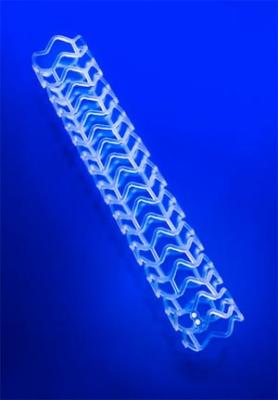
September 24, 2014 — A new study that compares the use of an everolimus-eluting bioresorbable vascular scaffold (BVS) with everolimus and biolimus eluting stents found that BVS demonstrated satisfactory and comparable angiographic and clinical outcomes compared to the two drug-eluting stents (DES). Findings were reported at the 26th annual Transcatheter Cardiovascular Therapeutics (TCT) scientific symposium in Washington, D.C.
Bioresorbable vascular scaffolds are thought to reduce long-term complications, such as neoatherosclerosis and very late stent thrombosis, by restoring more physiological vascular function. While current evidence demonstrates the feasibility of BVS implantation in simple patients and non-complex lesions, BVS is increasingly used in complex patients and lesions. The EVERBIO II trial is the first to compare the efficacy of BVS in all comers with new generation DES.
The single-center, parallel-group, assessor-blind, randomized controlled trial enrolled a total of 238 patients with either stable coronary artery disease or acute coronary syndrome undergoing percutaneous coronary intervention (PCI). Minimal exclusion criteria were used. Patients were randomly assigned to receive either BVS, everolimus-eluting stent (EES) or biolimus-eluting stents (BES). The primary endpoint was late lumen loss at 9 months measured by quantitative coronary angiography. Secondary endpoints were patient and device-oriented major adverse coronary events (MACE) at 12 months.
Eighty patients each were enrolled in the BES group and EES group, and 78 patients received BVS implantation. After nine months, in-stent late lumen loss was 0.25±0.36 in the EES/BES group and 0.28±0.39 in the BVS group (p=0.30). Device-oriented MACE occurred in 9 percent (n=15) in the EES/BES group and 12 percent (n=9) in the BVS group (p=0.6). Patient-oriented MACE occurred in 26 percent (n=41) in the EES/BES group and 27 percent (n=21) in the BVS group (p=0.83).
“In a patient population with minimal exclusion criteria, and using late lumen loss as an early and robust marker for restenosis, BVS demonstrated satisfactory angiographic and clinical outcomes compared to EES and BES,” said lead investigator Stéphane Cook, M.D., from the Hospital and University of Fribourg in Switzerland. “While in-segment late lumen loss was slightly but significantly higher in BVS compared to EES and BES, the EVERBIO II trial demonstrates that implantation of everolimus-eluting biodegradable scaffold is similar to new generation drug-eluting stents for the primary angiographic endpoint and secondary clinical endpoints.”
The EVERBIO II trial was funded by Fonds Scientifique Cardiovasculaire. Cook reported receiving speaker fee and honoraria from Abbot Vascular, Biosensors, Boston Scientific, Cordis and St. Jude Medical. Cook also receives support from the Swiss National Science Foundation.
For more information: www.crf.org, www.tctconference.com


 January 05, 2026
January 05, 2026 









